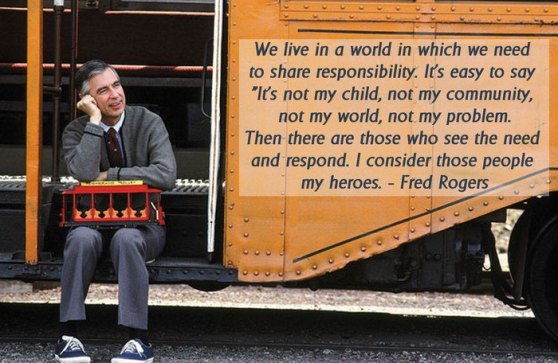
This sermon was preached at Ashland Presbyterian Church in Hunt Valley, Maryland on June 17, 2018. It is the second week of the Worship Series “The Gospel According to Mr. Rogers”.
Hello Neighbors!
In 1968 when Fred Rogers started Mr. Rogers’ Neighborhood he set out to change children’s television from consumer driven slapstick, to a show teaching children about life, love, and make believe.
He started every show with the song “Won’t you be my Neighbor?” and that was the question he was asking every single day.
Fred was a good neighbor. He was kind and gentle, he was loving and accepting. He never turned away a visitor and always listened to their stories with patience and grace.
One of the things I realized as I dug into this series is that Fred wasn’t teaching us (the viewers) how to be good neighbors by instruction. He was a good neighbor and lead by example. We learned how to be good neighbors by watching him.
Our job, our responsibility, was to respond to the invitation he proposed in mutual relationship at the beginning of each episode: “Won’t you be my neighbor?” And you wanted to say YES! After all, he’s always wanted a neighbor just like us!
In our scripture lesson this morning we get another story of a good neighbor. The story of the man who falls into the hands of robbers is a man in need of help, desperate help, as he is described in bad shape being left half dead.
A priest and a Levite avoided the man, crossing to the other side of the road, but the foreigner, the Samaritan, takes the man, cares for him out of his own pocket and makes sure he gets continued care.
The Samaritan answers the call of the dying man, “Won’t you be my neighbor?” and responds with a room and fresh bandages and an ongoing relationship of care. And by Jesus emphasizing the priest and the Levite ignoring the man, but the foreigner helping, Jesus is emphasizing to us that our neighbors aren’t simply the people who live down the street or speak our language, or even pray to our same God. All are our neighbors.
So… Which of these three, do you think, was a neighbor to the man who fell into the hands of the robbers? Jesus asks. The one who showed mercy. And Jesus instructs the lawyer to “go and do likewise.”
Showing mercy, in other words, is being a neighbor.
But this is not a stand alone story, scripture explicitly gives this mandate “Love your neighbor” over 40 times and is implied hundreds. Even Paul in Romans 13 lifting loving your neighbor as the fulfillment of the law.
As we move through this series, we will be looking to embody the gospel through Mr. Rogers, we will strive to, in our own way, become more Mr. Rogers like, more neighborly, which is, merciful and loving.
As we enter this series, we must first start with ourselves:
Am I a good neighbor? Do I show mercy and love? Am I seeking others our in mutual invitation to be in merciful relationships with me?
What would it look like for me to be a good neighbor? And ask others to be our neighbor?
For our church to be a good neighbor? And ask others to be our neighbor?
For our city to be a good neighbor? And ask others to be our neighbor?
For our country to be a good neighbor? And ask others to be our neighbor?
As we watch this popular clip from the show I want you to observe all the ways Mr. Rogers invites Jeff Erlinger to be his neighbor in merciful, mutual relationship.
I want you to notice how he meets Jeff on the steps and sits to look him in the eye.
I want you to notice how he lets Jeff talk about things that may make us or others uncomfortable, but are very natural to him, how he lets him take his time showing off and feeling special.
Being neighborly may mean interacting with people who are different, who look and sound different, who may not be able to do the same things you do, who may sometimes make you uncomfortable.
Being neighborly means breaking out of your comfort in order to extend mercy. It means being vulnerable to learn something new, and accept someone not for what they can give you or do for you, not for what they have, but who they are.
Let’s take a look:
Go and do likewise

